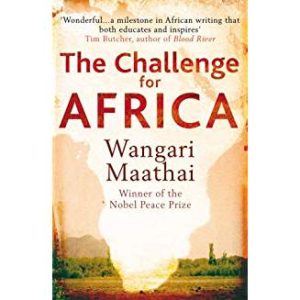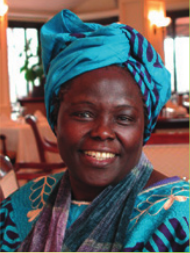Unbowed: A Memoir
 by Wangari Maathai. Knopf Publishing Group 2006
by Wangari Maathai. Knopf Publishing Group 2006
The story of Wangari Maathai reminds me of the saying: “Good girls go to heaven, but bad girls go everywhere.” Or in other words: If hell was a desert, only Wangari could plant a green belt through it.
 The Green Belt Movement will forever be connected with the name of Kenyan ecologist and political activist Wangari Maathai. The mother of three, she is a Kikuyu woman who, like generations before her, grew nourishing food in the rich soil of Kenya’s central highlands. She studied biological sciences in the USA, Germany and Kenya, and was the first woman in East and Central Africa to earn a doctorate degree. She was active in the National Council of Women of Kenya where she introduced the idea of planting trees with the people in 1976. Soon she developed the idea into a broad-based, grassroots organization whose main focus was the planting of trees with women groups in order to conserve the environment and improve their quality of life.
The Green Belt Movement will forever be connected with the name of Kenyan ecologist and political activist Wangari Maathai. The mother of three, she is a Kikuyu woman who, like generations before her, grew nourishing food in the rich soil of Kenya’s central highlands. She studied biological sciences in the USA, Germany and Kenya, and was the first woman in East and Central Africa to earn a doctorate degree. She was active in the National Council of Women of Kenya where she introduced the idea of planting trees with the people in 1976. Soon she developed the idea into a broad-based, grassroots organization whose main focus was the planting of trees with women groups in order to conserve the environment and improve their quality of life.
Maathai tells her life from childhood until she was awarded the Nobel Peace Prize in 2004. She describes Kenya in 1940, when she was born, as a former paradise with green forests and regular seasons. She describes the rites and values of her people, the Kikuyu, that were rendered from one generation to the next. They appreciated the beautiful land as a gift from God.
“I was born the third of six children, and the first girl after two sons, on April 1, 1940, in the small village of Ihithe in the central highlands of what was then British Kenya. My grandparents and parents were also born in this region near the provincial capital of Nyeri, in the foothills of the Aberdare Mountain Range. To the north, jutting into the sky, is Mount Kenya… At the time of my birth, the land around Ihithe was still lush, green, and fertile. The seasons were so regular that you could almost predict that the long, monsoon rains would start falling in mid-March. In July you knew it would be so foggy you would not be able to see ten feet in front of you, and so cold and frosty in the morning that the grass would be silvery-white with dew. In Kikuyu, July is known as mworia nyoni, the month when birds rot, because birds would freeze to death and fall from the trees.”
By the time she was an adult, Kenya was a poor and deforested land, a lost paradise. This dramatic change in the Kenyan landscape called for action. Wangari started a career as a university professor, became chair of the Department of Veterinary Anatomy at the University of Nairobi and began to fight for women’s rights. Having an experience of the strong connection between the corrupt system of Kenyan policies and the destruction of the environment, she became a political activist. She made the Green Belt Movement part of a broader campaign for democracy. Her campaign against land-grabbing and the rapacious allocation of forest land attracted attention. Maathai engaged in political activities that landed her in jail several times. She endured personal attacks by the ruling powers, especially by Arap Moi, the then-president of Kenya. But she never gave up. On the contrary, she established a Pan African Green Belt Network. When a new government came into power in 2002, she was elected to Parliament and appointed assistant minister in the Ministry for Environment and Natural Resources. In her memoir, Maathai stresses the connection between environmental conservation and good governance, proving the fact that if you are true to your ideas, nobody can stop you.
The unbowed Maathai was awarded many prizes, including the Nobel Prize, and was elected by Earth Times as one of 100 persons in the world who have made a difference in the environmental arena.
Novels and Autobiographies
African Traditional Life
Amkoullel, A Fula Child
Autobiographies
Aké. The Years of Childhood
Dreams in a Time of War
Facing the Lion: Growing Up Maasai on the African Savanna
Long Walk to Freedom
My Story
Unbowed: A Memoir
Coming of Age
Mandela’s Ego
Miriam's Song
Nervous Conditions
Purple Hibiscus
The Mending Season
Emigration
Lessons in Humanity
A Long Way Gone. Memoirs of a boy soldier
Child Soldier: Fighting for my life
I die, but my Memory lives on
Praise Song
Sozaboy
Stories about Friendship



